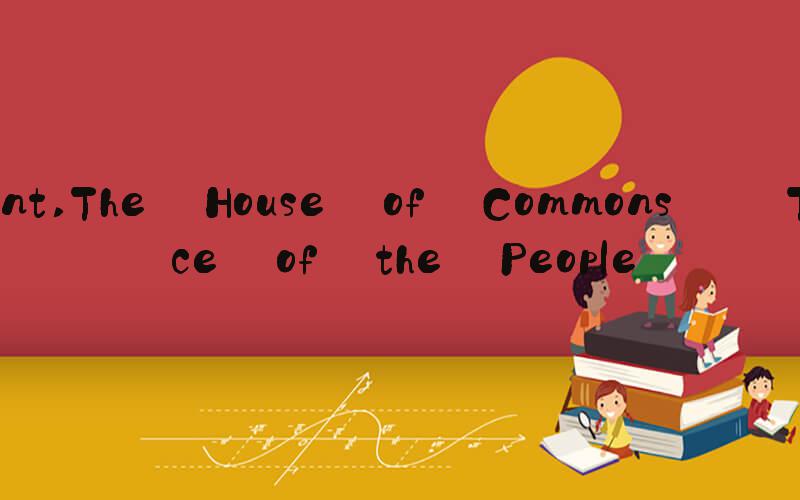 Parliament: The Central Institution of British Politics
Parliament: The Central Institution of British PoliticsThe Parliament of the United Kingdom is the supreme legislative authority in the country. It is a bicameral institution consisting of the House of Commons and the House of Lords. The Parliament is situated at the Palace of Westminster in London, which has been the seat of the British government since the 11th century. The Parliament holds the power to make, unmake, and amend laws, levy taxes, and scrutinize the activities of the government. It is the central institution of British politics and plays a crucial role in shaping the nation's future.
The House of Commons: The Voice of the PeopleThe House of Commons is the lower house of the Parliament and is made up of 650 members of parliament (MPs). The MPs are elected by the people through a general election that is held every five years. The House of Commons is responsible for initiating and debating legislation, holding the government to account, and representing the interests of the people. The House of Commons is led by the Speaker, who is elected by the MPs and is responsible for maintaining order, ensuring that the rules are followed, and representing the House to the monarch and the public.
The House of Lords: The Chamber of Expertise and ExperienceThe House of Lords is the upper house of the Parliament and is made up of around 800 members. Unlike the House of Commons, the members of the House of Lords are not elected. Instead, they are appointed by the monarch on the advice of the Prime Minister. The House of Lords has two main functions: to scrutinize and amend legislation passed by the House of Commons, and to act as a chamber of expertise and experience. The House of Lords is led by the Lord Speaker, who is elected by the members of the House of Lords and is responsible for ensuring that the procedures of the House are followed and that debates are conducted in a fair and impartial manner.
The Role of Parliament in the British ConstitutionParliament plays a central role in the British constitution. It is the ultimate source of authority in the country and is responsible for ensuring that the government is accountable and that the rights of the people are protected. The British constitution is unwritten, which means that it is made up of a combination of laws, conventions, and traditions. The Parliament is responsible for interpreting and enforcing the constitution, and it has the power to make, unmake, and amend laws. The Parliament is also responsible for ensuring that the government operates within the limits of the constitution and that it acts in the best interests of the country as a whole.
The Importance of Parliamentary DemocracyParliamentary democracy is a form of government in which the people elect representatives who are responsible for making, unmaking, and amending the laws of the country. Parliamentary democracy is a crucial aspect of the British political system, as it ensures that the government is accountable to the people. Parliament provides a forum for the people to voice their concerns and hold the government to account. It ensures that the government acts within the limits of the law and that it operates in the best interests of the people. Parliamentary democracy also ensures that the government is responsive to the changing needs and concerns of the people and that it is able to adapt to new challenges and opportunities.
The Future of Parliament in British PoliticsThe future of Parliament in British politics is uncertain. The Parliament has faced a number of challenges in recent years, including the rise of nationalist and populist movements, the Brexit referendum, and the COVID-19 pandemic. These challenges have led to a growing sense of disillusionment among the public and a loss of trust in the political establishment. However, the Parliament remains a vital institution in British politics, and there is a growing sense that it needs to be reformed to ensure that it remains relevant and effective in the years ahead. Some of the proposals for reform include reducing the number of MPs, introducing electronic voting, and giving more powers to local governments. Whatever the future holds for the Parliament, there is no doubt that it will continue to be a central institution in British politics for many years to come.
